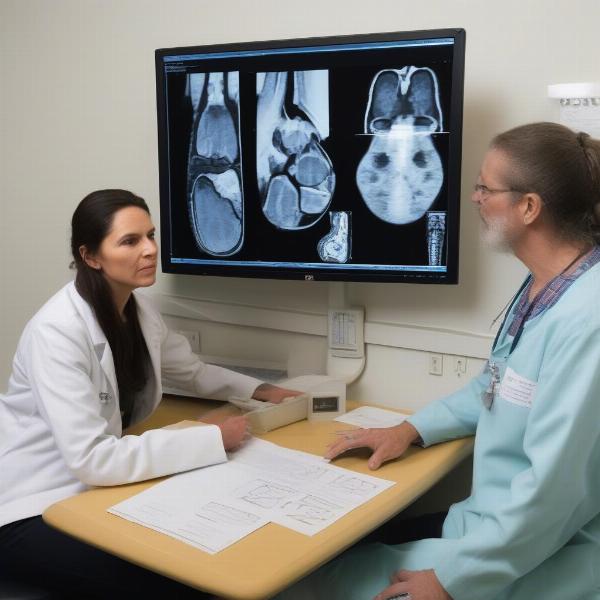Understanding the costs associated with advanced diagnostic imaging like CT scans for your furry friend is crucial. This article dives into the factors influencing dog CT scan cost, providing you with a clearer picture of what to expect financially when your vet recommends this procedure. We’ll cover everything from the reasons behind the scan to ways you might be able to manage the expenses.
Decoding Dog CT Scan Costs: A Comprehensive Guide
Veterinary CT scans, much like those for humans, offer detailed cross-sectional images of your dog’s internal organs. They are invaluable diagnostic tools, aiding vets in identifying a range of conditions from tumors and fractures to internal bleeding and infections. But how much are CT scans for dogs? The price tag can vary significantly, typically ranging from $500 to $1,500 or even more. Several factors contribute to this price range.
Factors Affecting CT Scan Prices for Dogs
- Geographic Location: Veterinary costs, like many other services, tend to be higher in metropolitan areas compared to rural locations.
- Complexity of the Scan: A scan focusing on a specific area might cost less than a full-body scan requiring more extensive imaging and analysis.
- Need for Contrast Dye: Sometimes, a contrast dye is injected to enhance the visibility of certain tissues or organs. This adds to the overall cost.
- Anesthesia and Monitoring: CT scans require general anesthesia to ensure your dog remains still during the procedure. Anesthesia costs and post-anesthetic monitoring contribute to the total expense.
- Veterinary Clinic: Specialty veterinary hospitals or emergency clinics often charge more than general practice clinics.
Is a CT Scan Really Necessary for My Dog?
The decision to perform a CT scan rests with your veterinarian. They’ll consider your dog’s symptoms, medical history, and the results of other diagnostic tests before recommending a CT scan. It’s a powerful tool for diagnosing complex or unclear cases, offering insights that other imaging techniques may not provide.
“CT scans can be lifesavers,” says Dr. Emily Carter, DVM, a board-certified veterinary radiologist. “They allow us to see things that would be impossible to detect with traditional X-rays, leading to more accurate diagnoses and treatment plans.”
Managing the Cost of CT Scans for Your Dog
Facing a significant veterinary bill can be daunting. Here are some strategies to help manage the financial burden:
- Pet Insurance: If your dog is insured, your policy may cover some or all of the CT scan costs. Check your policy details for coverage limits and reimbursement procedures.
- CareCredit: CareCredit offers financing options specifically designed for veterinary expenses, allowing you to spread the cost over time.
- Payment Plans: Some veterinary clinics offer in-house payment plans to help clients manage large bills. Discuss this option with your vet.
- Financial Assistance Programs: Various organizations offer financial assistance for pet owners facing unexpected veterinary costs. Research these programs in your area.
What Happens During a Dog CT Scan?
Your dog will be placed under general anesthesia and positioned on the CT scan table. The scanner rotates around your dog, taking multiple X-ray images from different angles. These images are then compiled by a computer to create detailed cross-sectional views of your dog’s internal structures. The procedure is typically quick, often completed within 30-60 minutes.
 Veterinarian explaining CT scan results to pet owner
Veterinarian explaining CT scan results to pet owner
Conclusion
While CT scans for dogs can be expensive, they provide invaluable diagnostic information that can lead to more effective treatment. Understanding the factors influencing the cost and exploring financing options can help you prepare for this expense and ensure your furry companion receives the best possible care. Don’t hesitate to discuss any concerns about the cost or the procedure with your veterinarian. They are there to support you and your pet through this process.
FAQ
- Q: Are CT scans painful for dogs? A: No, the procedure itself is painless as it is performed under general anesthesia.
- Q: How long does it take to get the results of a dog CT scan? A: Typically, your veterinarian will receive the results within 24-48 hours.
- Q: Are there any risks associated with dog CT scans? A: As with any medical procedure, there are some minor risks associated with anesthesia. However, these are generally low.
- Q: What are the alternatives to CT scans for dogs? A: Alternatives include X-rays, ultrasound, and MRI, depending on the suspected condition.
- Q: Can my regular vet perform a CT scan? A: Some general practice clinics have CT scanners, while others may refer you to a specialist.
- Q: What should I expect after my dog’s CT scan? A: Your dog will need some time to recover from the anesthesia. Your vet will provide post-operative care instructions.
- Q: How can I find low-cost CT scans for my dog? A: Contact local animal shelters or veterinary schools, as they may offer discounted services.
Related Articles
- dog ct scan cost
- splenectomy in dogs cost
- how much does a dog leg amputation cost
- dog bowel obstruction surgery
ILM Dog is your trusted international resource for comprehensive dog care information. We cover everything from breed selection and healthcare to training, nutrition, grooming, and product recommendations. Our expert advice helps both new and experienced dog owners provide the best possible care for their furry companions. We specialize in Breed Selection, Health & Medical Care, and Products & Accessories. Contact us for expert guidance at [email protected] or +44 20-3965-8624. Visit ILM Dog for more information.